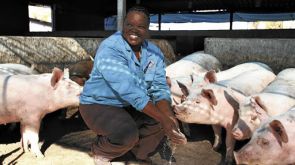
‘When you network, you hear about how others started their businesses and you get motivated to wake up tomorrow and continue knocking on doors’
Anna Phosa is the only black female commercial pig farmer in SA. She hails from Soweto and started Dreamland Piggery & Abattoir in Vanderbijlpark in the Vaal in 2004 after buying four piglets.
She grew her business and in 2008 secured her first contract — to provide Pick n Pay with 10 pigs a week. By 2010 she was delivering 100 pigs a week to the retailer and had a multimillion-rand contract over five years.
By November 2016, she was supplying Pick n Pay with 300-350 pigs a week. Dreamland Piggery is now breeding its own stock and buying additional pigs from local farmers.
Phosa has created a thriving, full-service pig production business and remains hands-on in every aspect. She is one of a growing number of women agripreneurs in SA who are blazing a food production trail and overcoming the many challenges that confront them.
Her story was one of 12 agripreneurship case studies farmers and policy makers explored at the African Agripreneurship workshop in Cape Town in May with more than 40 participants from 14 countries in sub-Saharan Africa.
“When you network, you hear about how others started their businesses and you get motivated and confident enough to wake up tomorrow morning and continue knocking on doors,” says Phosa.
In addition to exploring the 12 case studies, other key agripreneurship qualities discussed at the workshop included business intelligence; willingness to assume risk and deal with uncertainty; creativeness, energy and the ability to recover from setbacks; age, education and gender, access to finance and family circumstances.
It was a fascinating sharing of knowledge and experience, facilitated by the Food and Agriculture Organisation of the UN and EcoVentures International, a not-for-profit organisation supporting sustainable economies.
Both organisations focus on food security, increased agricultural production and the sustainable management of natural resources, empowering communities, particularly the vulnerable (youth, women and girls) and creating an enabling environment for agripreneurs.
They produce a valuable publication, Agribusiness Entrepreneurship in Africa.
They explain in the publication that African countries have particularly weak infrastructure and educational systems, which lead to a lower propensity for entrepreneurial activity. The lack of access to reliable and affordable electricity and information and communications technologies, coupled with delays of goods in transit, are some factors hindering small businesses in Africa.
Despite this, the continent has the highest reported positive attitude towards entrepreneurship and entrepreneurial intentions, with 75% of adults considering entrepreneurship a good career choice and 42% intending to become entrepreneurs, according to the Global Entrepreneurship Monitor 2017.
Africa has all the ingredients to drive agripreneurship, as the continent has much of the land and resources that are pivotal to meeting the food needs of the world. Agriculture accounts for 15% of the continent’s GDP and employs half of its workforce.
Agribusiness Entrepreneurship in Africa showcases how 12 agripreneurs reached impact at scale until they were supplying national and export markets. They are not only engaged in production-level activities but have developed agribusinesses along the full value chain — including processing, packaging, logistics, marketing, wholesaling, service provision or input supply activities.
Their stories are inspiring. They pave the way for budding entrepreneurs in Africa to consider business opportunities in agriculture and agro-industries.
Driven by the harsh realities of poverty and suffering of Senegalese livestock herders, at the age of 27 Bagoré Bathily, a trained livestock veterinarian, started a social enterprise.
Bathily was determined to lift the people of northern Senegal, especially the livestock herders, out of poverty through his business, Laiterie du Berger — the only one of Senegal’s few home-grown dairy firms that buys milk from small-scale herders.
Today Bathily’s company is flourishing and its Dolima brand products are sold all over Senegal. He made good on his commitment — the company provides the herders with a steady income and support services to improve their livelihoods.
In 2006 Erick Rajaonary had a chat with a friend about the ecological benefits of using guano as fertiliser, and learnt it was used in Latin America.
This titbit of information sparked his entrepreneurial spirit and prompted him to research the potential of starting a bat guano fertiliser business in Madagascar.
He became the founder and owner of Guanomad, the largest seller of guano fertiliser in Madagascar. Known locally as the “green visionary”, Rajaonary and his firm have transformed fertiliser production in the island country. He made a success of his business despite having to deal with government instability and corruption, and prejudice against using organic products.
Growing up in rural Uganda, Josephine Okot saw how hard women worked to raise their families and tend their fields. Her mother had single-handedly raised her and her six siblings after her father passed away.
“I was driven by the desire to make a difference in the lives of rural Ugandan women,” she explains. “Growing up, I saw that women held their families together, headed households during civil war and contributed most of the agricultural production in Uganda.”
Recognising that Uganda’s agricultural performance fell short of its potential, Okot set out to transform the sector by focusing on enhancing the quality of seed. Victoria Seeds Limited is now a leading seed house in East Africa.
First published in Business Day on Tuesday, 19 June 2018.
